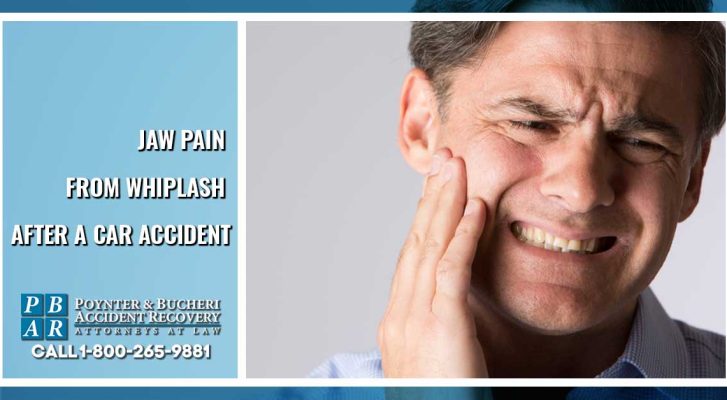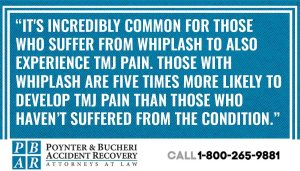
Jaw Pain From Whiplash After a Car Accident

Car accidents can cause victims to sustain numerous types of injuries ranging from mild to fatal. One especially common injury is whiplash. Whiplash usually occurs when a person’s head whips back and forth in a sudden motion, causing strain and damage to the soft tissues of the neck. This sudden trauma is common in car accidents because the impact of a collision can cause a victim’s head to abruptly move forward and back.
While whiplash alone is a serious condition that requires medical attention, the injury can also cause other afflictions, including severe and persistent jaw pain. If you’re experiencing jaw pain from whiplash, you may be suffering from a temporomandibular joint (TMJ) disorder. Here’s what you need to know about developing TMJ after a car accident.
What is TMJ?
The temporomandibular joints reside on the sides of your head in front of your ears and connect your skull to your jawbone. People frequently use their temporomandibular joints because they are crucial components for speaking, eating, brushing teeth, and making facial expressions.
There are three main types of TMJ disorders:
- Myofascial Pain: Pain in the muscles that control jaw movement and surround the temporomandibular joints. Those with TMJ disorder may also experience myofascial pain in the neck and shoulders.
- Disc Displacement: Internal displacement of the disc that resides between your skull and lower jaw, known as the temporomandibular joint disc.
- Arthritis: Arthritis can cause the temporomandibular joints to degenerate.
While TMJ disorder will primarily cause pain in your jaw, you may also suffer from discomfort in other areas, including your teeth, head, and ears. The disorder may even cause you to experience clogged ears with jaw pain.
Developing TMJ From a Car Accident

While car accidents aren’t the only cause of TMJ disorders — other traumatic injuries can cause these issues, such as sports injuries and assaults — the condition is especially common for car accident victims who develop whiplash.
When a person’s head whips back and forth in a collision, the abrupt and forceful movement can disrupt the natural positioning of the jaw and place a great deal of pressure on the temporomandibular joints, resulting in TMJ disorder.
It’s incredibly common for those who suffer from whiplash to also experience TMJ pain. In fact, those with whiplash are five times more likely to develop TMJ pain than those who haven’t suffered from the condition.
TMJ Symptoms
TMJ disorder can manifest in a variety of ways. Some indications that you may be struggling with this condition include:
- Jaw pain or discomfort
- Clicking, popping, or grating sounds when moving the jaw
- Jaw stiffness or locking
- Facial pain or tenderness, especially around the jaw joint, temples, or cheeks
- Earache or pain that may be mistaken for an ear infection
- Headaches
- Sensitivity to light
- Neck, shoulder, and back pain
- Pain or difficulty while chewing or talking
- Tooth sensitivity
- Jaw muscle fatigue
- Dizziness
- Ringing or buzzing in the ears
- Depression
If you suspect that you’ve developed TMJ disorder, you should seek medical attention as soon as possible to diagnose the issue.
Treating TMJ
Receiving a proper diagnosis for TMJ can be challenging because the condition can impact many different areas of the body. You may need to consult with both your primary care physician as well as a dentist who can examine your jaw alignment.
To diagnose the issue, your medical advisor will likely use imaging services, such as an MRI or X-ray. They’ll also likely examine your temporomandibular joints and jaw movement as well as surrounding muscles.
Fortunately, TMJ typically doesn’t require surgery. Your doctor will likely prescribe non-invasive methods for treating the condition, such as heat and ice and anti-inflammatory medications.
Recovering Compensation for Whiplash and TMJ
If you’ve suffered from whiplash and TMJ disorder after a crash, you need to file a claim against the responsible driver. Otherwise, you may be forced to pay out of pocket for your medical treatments and related expenses. While whiplash and TMJ typically don’t require surgery, you’ll likely still have expensive medical bills for diagnosing the issue and receiving treatment.
To recover damages from the responsible driver, you’ll need to be able to prove that they were at fault for your accident.
Forms of evidence you can use to build your case include:
- Photographic and video evidence
- Eyewitness statements
- The police accident report
- Traffic citations against the negligent driver
- Accident reconstruction expert testimony
You’ll also need to be able to prove that the accident in question directly caused you to suffer damages. The at-fault driver’s insurance company may claim that your injuries didn’t result from the crash, meaning their client isn’t liable.
To prove that the accident caused you to develop whiplash and TMJ disorder, you can collect the following evidence:
- All medical records, including doctor’s notes, diagnostic tests, and medical bills.
- Statements from your doctor or dentist
- Photos and videos documenting your medical condition
- Expert medical opinions
“I Got Hit in the Jaw and My Ear Hurts.” Contact a Car Accident Attorney
If you’re suffering from whiplash, TMJ disorder, or another jaw injury due to a driver’s negligence, you need to contact a car accident lawyer. Legal representation will greatly increase your likelihood of recovering fair compensation because they can negotiate a higher settlement on your behalf.
For expert car accident lawyers in Indianapolis, contact Poynter & Bucheri Accident Recovery Attorneys at Law. We’ll help you prove your claim and will work to maximize your settlement amount. Depending on your case, you may be able to recover compensation for property damage, medical bills, lost wages, pain and suffering, and loss of future earnings.
You can schedule a free case review with our attorneys by calling 1-800-265-9881, or you can make your appointment online here.
